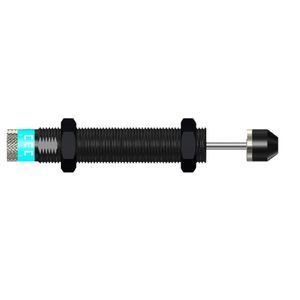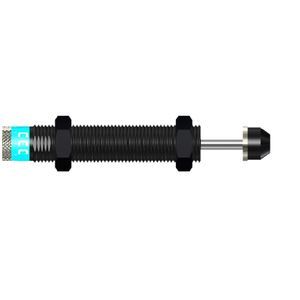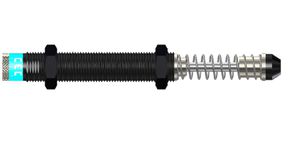
- Matériaux - Outillage - Composants
- Élément Mécanique Standard
- Amortisseur de choc
- CEC YUH BAW CO., LTD.
Absorbeur de choc FC1410hydrauliqueindustrielpour machines
Ajouter à mes favoris
Ajouter au comparateur
Caractéristiques
- Fonction
- de choc
- Technologie
- hydraulique
- Applications
- industriel, pour machines
- Autres caractéristiques
- réglable
- Capacité de charge
Min: 5 N
Max: 12 N
- Course
10 mm
(0,39 in)- Longueur du filetage / taraudage
67 mm
(2,6 in)- Diamètre
12,2 mm
(0,5 in)- Diamètre du filetage
14 mm
(0,6 in)- Hauteur
101,9 mm
(4 in)
Description
To save costs, factories typically use solid buffers such as polyurethane and rubber. However, these can result in noise and transient impacts. Choosing the right shock absorber can reduce impact vibrations and noise, improve efficiency, and extend the lifespan of machinery, thereby enhancing reliability and production yield. Additionally, noise reduction implies environmental friendliness.
The function of CEC shock absorbers is to convert the kinetic energy of moving objects into heat, dissipating it into the atmosphere. They can smoothly and quietly stop the movement of objects before severe impacts occur.
The FC series is designed with an adjustable structure. When encountering different loading, and different impact speeds, users can adjust the adjustment knob to modify the most appropriate scale, and perfectly absorb the energy generated by the objects. Compared to the SC series, the FC series has a higher energy absorption capacity and a larger range of applications.
The FC1410 is a shock absorber that comes with a thread M14 pitch 1.5 or 1.0mm, each with 2 nuts, and the stroke is 10mm. This specific product is packaged in a PE bag and uses color box packing.
Autres produits CEC YUH BAW CO., LTD.
HYDRAULIC SHOCK ABSORBERS FC SERIES
Recherches associées
- Absorbeur de choc
- Absorbeur hydraulique
- Absorbeur mécanique
- Tampon en métal
- Absorbeur industriel
- Absorbeur pour machines
- Amortisseur antivibration
- Absorbeur réglable
- Absorbeur auto-compensateur
- Absorbeur en inox
- Tampon en caoutchouc
- Tampon pneumatique
- Absorbeur miniature
- Absorbeur haute performance
- Absorbeur grande course
- Absorbeur à double amorti
* Les prix s'entendent hors taxe, hors frais de livraison, hors droits de douane, et ne comprennent pas l'ensemble des coûts supplémentaires liés aux options d'installation ou de mise en service. Les prix sont donnés à titre indicatif et peuvent évoluer en fonction des pays, des cours des matières premières et des taux de change.
















